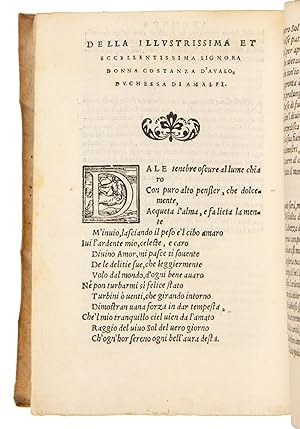Riguardo questo articolo
A nice, unsophisticated copy in contemporary limp vellum. Title dusty, a few light marginal stains, marginal paper flaw (not affecting text) to leaf *4, short worm-trail in lower margin of five gatherings (Q-S, V-X), touching a single letter in the bottom line of text on some lvs., damp-stain to 4 lvs. in gathering FF and at end, a few other stray marks. This important scholarly edition of the poems of Vittoria Colonna, a copy of which was owned by Colonna s friend Michelangelo (with whom Colonna exchanged verses and from whom she received drawings), is a primary resource for understanding the contemporary critical reception of Colonna s poetry. This edition includes five NEVER BEFORE PUBLISHED sonnets by Costanza d Avalos, Duchess of Amalfi and Vittoria Colonna s cousin by marriage. Very few of d Avalos poems have survived. By having them printed, Ruscelli has preserved for us another voice from an important coterie of Italian women writers. Also included are two poems, "Mentre da vaghi, e giovenil pensieri…" and "O de la nostra etade unica gloria…", by Veronica Gambara, the other "great pioneer of sixteenth-century vernacular women's writing"(Cox), very few of whose poems were published in the 16th century. This 1558 edition of Colonna s poems contains the first complete printing of Rinaldo Corso s commentaries on the rime, the first part of which is printed here for the first time. Moreover, the recension of the second part of Corso s commentary in this edition is distinctly different from the version printed already in 1543. In "Le due ridazioni del commento di Rinaldo Corso alle Rime di Vittoria Colonna" Monica Bianco writes that the collation of the two versions of the second part of Corso s commentary "permette di rilevare tali e tante varianti da imporre l evidenza che i due testi afferiscano a due redazioni distinte… È difficile dire con esattezza quando il Corso abbia rimaneggiato l opera."(p. 283) In his dedicatory letter to the new Marchesa of Pescara, Isabella Gonzaga, the editor, Girolamo Ruscelli informs us that the commentary arose from conversations between Corso and his patron, the poet and stateswoman Veronica Gambara (1485-1550), during which they discussed Colonna s poetry. Corso s commentary "reveals a huge amount about the manner in which Colonna s poetry was received and interpreted by readers with a particular interest in the spiritual questions that she explores." Corso "worked at the court of Correggio in the service of the other noted female Petrarchist of the period, Veronica Gambara. Corso s commentary sets out to canonize Colonna s poetry, inserting into a lineage of great vernacular texts as well as establishing its links with important classical precedents and thus assuring its status in its own century as a work that embodied the necessary duality of being both beautiful and serious."(Brundin, Vittoria Colonna and the Spiritual Poetics of the Italian Reformation, p. 156) The poetic production of Vittoria Colonna comprises two main characters: one profane, which consists of Petrarchan poems celebrating the love for her husband, the Marquis of Pescara Francesco d'Avalos, whom she married in 1509 and who died in battle in 1525; and one sacred, in which the personal pain for the loss of her husband is transfigured and becomes more and more universal up to a point in which it coincides with the pain of Christ on the cross. If in the first editions of the Rime (1538 and 1539) the spiritual character occupies only a small part of the collection, it gradually increases over the years… "Although Colonna literary activity spanned over twenty years, her lyrics are clearly marked by a uniform maturity of style. She achieved a highly successful balance between, on the one hand, "correct" poetic language (in which she imitated Petrarch rigorously) and content (unblemished devotion to the memory of her husband); and on the other hand a perfect harmony between stylistic tension (always in search of a "high". Codice articolo 4657
Contatta il venditore
Segnala questo articolo
![]()




